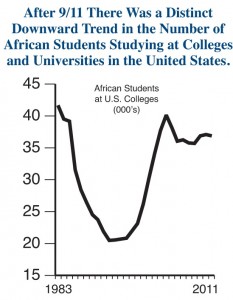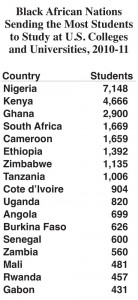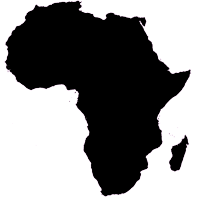 From 1992 to 2001 there was a steady increase in the number of foreign students at U.S. colleges and universities. During this period the number of African students at U.S. colleges and universities doubled.
From 1992 to 2001 there was a steady increase in the number of foreign students at U.S. colleges and universities. During this period the number of African students at U.S. colleges and universities doubled.
 But after the September 11, 2001 terrorist attacks, it became more difficult to obtain a visa to study in the United States. In the 2002-03 academic year there were 40,193 students from Africa at American colleges and universities. Two years later enrollments of students from Africa had dropped by more than 10 percent to 36,100.
But after the September 11, 2001 terrorist attacks, it became more difficult to obtain a visa to study in the United States. In the 2002-03 academic year there were 40,193 students from Africa at American colleges and universities. Two years later enrollments of students from Africa had dropped by more than 10 percent to 36,100.
Since that time the number of African students at U.S. colleges and universities has fluctuated only slightly. But the percentage of all foreign students in the U.S. who are from Africa has declined. According to the latest data from the Institute of International Education, in 2011 there were 36,690 Africans studying in the United States. They made up 5.1 percent of all foreign students in the U.S., down from 6.1 percent four years ago.
 It is important to note that many African students studying in the U.S. are not Black. A large contingent of African students come from the Arab nations of North Africa. In 2011 Egypt sent more than 2,100 students to U.S. colleges and universities. In addition, there are no reliable statistics on how many of the 1,669 students from South Africa are White. But overall, we can make a reasonable estimate that at least 25,000 Black Africans are currently studying at colleges and universities in the United States.
It is important to note that many African students studying in the U.S. are not Black. A large contingent of African students come from the Arab nations of North Africa. In 2011 Egypt sent more than 2,100 students to U.S. colleges and universities. In addition, there are no reliable statistics on how many of the 1,669 students from South Africa are White. But overall, we can make a reasonable estimate that at least 25,000 Black Africans are currently studying at colleges and universities in the United States.
Among Black African nations, Nigeria in 2010-11 sent the most students to American colleges and universities. In 2010-11, 7,148 Nigerians were studying here. Nigerian enrollments have tripled since 1995.
In 2010-11 Kenya ranked second, sending 4,666 students to the United States. But enrollments from Kenya have declined in recent years. Ghana ranked third with 2,900 students at U.S. colleges and universities.
Zimbabwe, South Africa, Tanzania, Cameroon, and Ethiopia each had more than 1,000 students studying in this nation. Zambia, Ivory Coast, Uganda, Angola, Burkina Faso, and Senegal all sent at least 500 students to study at U.S. colleges and universities.
All told, 50 Black African nations had college students studying in the U.S. during the 2010-11 academic year.












What is Black Africa and why is this article entitled as such? If the argument is African students being used as a proxy for ethnic diversity in US schools then discuss that issue. Regardless of ethnicity, Africans are Africans. Too often we interchange nationality with ethnicity and culture, but they are distinct issues with a separate context. As a journal for eduction professionals, we should elevate the discussion, not pander to common ignorance.
I concur with Ingram’s comment, What is Black Africa and Why is this article entitled as such? Africa is not a homogeneous society, the continent is very diverse, including various races and ethnicity. Africans are Africans regardless of their race or ethnicity, as such it is high time we recognize that Africa is not a village rather a continent of diversity.